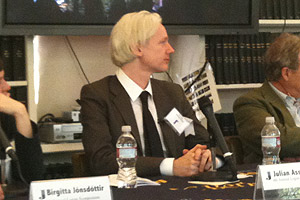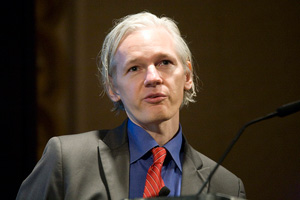
Julian Assange | Photo: Dave Gilson.
The US government is preparing a case against Wikileaks supremo Julian Assange, the New York Times‘ Charlie Savage reported Wednesday night:
Justice Department officials are trying to find out whether Mr. Assange encouraged or even helped the analyst, Pfc. Bradley Manning, to extract classified military and State Department files from a government computer system. If he did so, they believe they could charge him as a conspirator in the leak, not just as a passive recipient of the documents who then published them.
Among materials prosecutors are studying is an online chat log in which Private Manning is said to claim that he had been directly communicating with Mr. Assange using an encrypted Internet conferencing service as the soldier was downloading government files.
Wired published the “online chat log” in June. Kevin Poulsen, an editor at Wired who has been covering the Wikileaks story for months, says the section in question begins with “preferably openssl the file with aes-256.” Check it out.
This isn’t necessarily an easy win for prosecutors. The government’s case requires proving Assange was in contact with Manning during the time Manning had access to the military network containing the classified information he later leaked. It’s not clear that the government can meet that burden. But if the government moves forward with the prosecution, it’s not just Assange who will have reason to worry. American Prospect blogger Adam Serwer and former Bush Justice department official Jack Goldsmith, who don’t often agree, both think prosecuting Assange for allegedly “helping” Manning leak documents would have a chilling effect on press freedom and national security reporting. Here’s Goldsmith:
Charging Assange as a conspirator to Manning’s leak might distinguish the Times [from Assange] in the wikileaks case. But it would not distinguish the Times and scores of other media outlets in the many cases in which reporters successfully solicit and arrange to receive classified information and documents directly from government officials. Prosecution of Assange on this theory would therefore raise awkward questions about why DOJ does not bring charges against the American media for soliciting classified information on a regular basis. It would be a fateful step for traditional press freedoms in the United States. Indeed, unless I am missing something, it seems that a successful prosecution of Assange for conspiracy to leak would have broader and more corrosive implications for press freedoms than a successful prosecution under the ambiguity-riddled Espionage Act. In any event, I do not see how going the “conspiracy to leak” route is a press-protecting move.
As Savage notes in his story, the threat of a US prosecution is already having a chilling affect on Wikileaks, as the site is backing away from claims that it solicits classified information. Of course, mainstream American journalists implicitly and explicitly solicit classified information all the time. It’s becoming increasingly clear that, when it comes to leak-related prosecutions, Wikileaks’ problems are the American press’ problems, too.














